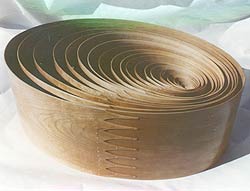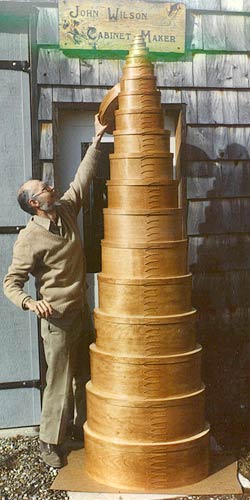
John Wilson may call himself a box maker, but to his understandably devoted customers, he is much more. Like a modern-day Johnny Appleseed, he travels the country sowing the seeds of Shaker box making, offering both knowledge and vital resources. In fact, his company is the sole source for some Shaker box supplies, but don’t let that scare you. Frankly, you could not ask for a kinder, gentler company to hold a monopoly on the materials needed for this slightly arcane craft.
The company, whose official name is “The Home Shop,” consists of John, his wife, two partners, and one part-time employee. They sell the unique copper tacks used in Shaker box making, along with wood pegs, bending stock, top and bottom blanks, cores, shapers, templates, trays, drilling jigs, anvils and, of course, informational books, pattern packs and videos. In short, they sell all you need to make, and learn to make, Shaker boxes.
You can’t order online , and they do not take credit cards, but for several good reasons, not the least of which is concern for their clients. “We need to talk to customers by phone to make sure they get what they expect, and what they really need,” he explains. Instead of credit cards, which would add to the cost, they work on trust. When you call to order something, they simply send it out, along with an invoice, and assume you will pay the bill. As it turns out, people always do. “Woodworkers are trustworthy,” says John. “They pay their bills.”
The company does no advertising beyond word of mouth, and has no competitors, but it’s not for lack of trying. John would prefer that there were, and he’s twice tried to set others up in the business. “I’d like to see more competition. I don’t think it is healthy to have just one supplier. There is a synergy that would accrue from having more. Shaker box making could be giving pleasure to a lot more people if there were other companies offering the supplies and spreading the word.”
In addition to the business of selling materials, John hits the road each year as an itinerant instructor, traveling in a pickup truck loaded with all the tools and materials the students will need. But in spite of the fact that he makes part of his living teaching, he is incredibly free when it comes to sharing what he knows. For those who don’t want a class, and don’t even want to buy a book, he posts complete instructions on how to make a Shaker box right on his web site, free to all who visit.

“People who are teachers don’t feel proprietary about their information the way some craftsmen do,” he explains. “If you share information, you get more connection, business and loyalty, and encourage people’s further pursuits. The more you hoard, the more you cut off that relationship.” All that notwithstanding, it is obvious talking to him that he is far more interested in helping others enjoy the craft than in banking dollars.
The trail to this odd niche was a long and convoluted one. As he explains it, he went through several decade-long increments of being an anthropologist, contractor, itinerant teacher and box maker, and entrepreneur, and is now writing articles and a book. As it often does, it started in his youth.
“My father had a small home shop with no power tools. At eight years old I was given free access, since there was little danger with hand tools.” He worked as a carpenter during college, but after getting a degree in anthropology, spent years teaching at several colleges. When he failed to get tenure, he turned back to woodworking.
His exposure to Shaker was pure serendipity. Hired at the eleventh hour to teach woodworking at Lansing Community College, he walked in with no lesson plan and no idea what to teach. “On my way to the very first class, I stopped by the library, and took “Shop Drawings of Shaker Furniture and Woodenware, Vol. I” by Ejner Handberg off the shelf. The class picked out a project, and we began.”

“I was fascinated by the Shaker boxes,” John recounted. “I tried, and failed, because wood bending is not part of the normal talents of a woodworker.” Jerry Grant from Hancock Shaker Village helped teach him enough to get started, and he learned more from Joel Kameraad, a guest instructor he hired in 1980. A half decade later, he got the opportunity to teach his former teacher what he had picked up in the intervening years. “I had a chance to settle our accounts,” he explains. “After all, information is the coin of the realm.”
In 1983, he loaded up his truck and became a freelance traveling teacher. As each class gained converts, it also created customers for box making supplies, and he created a business to fill the need.
When the sole supplier of the unique copper tacks used in Shaker boxes went out of business, he bought the antiquated belt-drive machines and started making the tacks himself. Today, they make seven sizes of copper tacks, most much smaller than what you can buy in the hardware trades. His tacks are well-made and slender, so they clinch without splitting the wood.
When all is said and done, though, his main concern seems to be spreading the word so that others may enjoy the craft. This sentence, taken from the front page of his catalog, says it best, and seems to reflect his philosophy as much as his business: “May your boxes bring satisfaction to you, and joy to others.”





